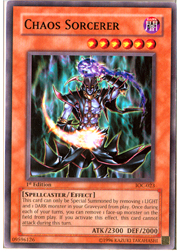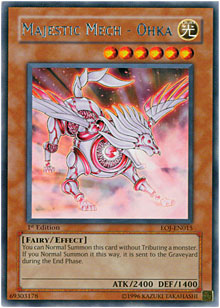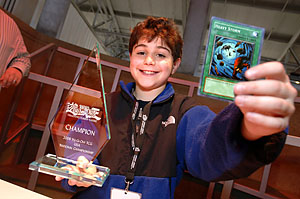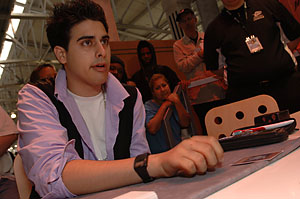The stories contained within this article are just as humorous and relevant now as they were six months ago when I originally wrote it. If you’re looking for metagame-breaking strategy or hot tech for your next event, you won’t find it here, but if you’re looking to learn a few things that will help you become a better player, you’re in the right place.
As anyone who attended the event knows, I had the honor of being a judge at this year’s US National Championship. While my main focus at the event was on my duties as a judge, it’s impossible to be at a tournament for ten hours with so many excellent players in attendance and not pick up any tips or tricks to help develop my skills as a player. Thus, I proudly present the things I’ve learned from the US Nationals weekend.
Keep Your Head in the Game
 Many of you have no doubt read the feature in the Nationals coverage called “Failing Marks.” Those who have will no doubt recognize the scenario I’m about to recount. It was toward the end of the round as I made my way about the tables, and one of the few matches remaining in my area involved a player facing down a couple of sizeable monsters, as well as Spirit Reaper. There was really only one card he could possibly draw in order to stay in the game, and that was Chaos Sorcerer. If he did draw the Sorcerer, though, it would be very difficult for him to lose, given that the opponent had already played all his power cards and had no backfield.
Many of you have no doubt read the feature in the Nationals coverage called “Failing Marks.” Those who have will no doubt recognize the scenario I’m about to recount. It was toward the end of the round as I made my way about the tables, and one of the few matches remaining in my area involved a player facing down a couple of sizeable monsters, as well as Spirit Reaper. There was really only one card he could possibly draw in order to stay in the game, and that was Chaos Sorcerer. If he did draw the Sorcerer, though, it would be very difficult for him to lose, given that the opponent had already played all his power cards and had no backfield.
The player in question drew his card for the turn, and his eyes suddenly lit up like streetlights at sunset. “I remove a Light and a Dark for Chaos Sorcerer!” he proudly announced. Letting his glee overtake his sensibility, he followed it up by shouting, “I remove Chaos Sorcerer!” His opponent looked at him, and I looked at him, and his jaw hit the ground having realized what he just did. “Can I take that back?” was the next thing out of his mouth, but unfortunately, I had to inform him that he had quite clearly stated what he was doing, regardless of what he should have been doing.
The lesson to be learned here is that no matter what emotional or physical strain you’re under at the time, you always have to do your best to stay focused on the task at hand. This unfortunate player was so excited about drawing his Sorcerer that he probably immediately started to picture himself in Top 8 playing for an invite to Worlds, and forgot that he was only in game 3 of round 3 or 4 with one loss already on his record. If he had taken the time to clear his thoughts and focus on the situation at hand, it would have taken a miracle for him to lose. In a similar vein, one should also keep one’s focus not just on the game at hand, but also on the turn at hand. It’s good to set yourself up for later turns of the game, but you can’t do so at the cost of not paying attention to what’s happening in the current turn. I can’t even begin to tell you how many games I’ve lost due to thinking too far in advance, and making moves that would work well in some ideal future situation but were horrible in my position at the time.
Prepare Adequately
Proper preparation is essential to success at the highest levels of play in this game. Not only do you need to prepare your deck and your skills through playtesting, but you also need to prepare your mind and body with a good night’s sleep and breakfast in the morning. After the Duel the Master event ended for the day on Sunday, Jason Grabher-Meyer and I decided that since there were still so many players who wanted to duel, we’d stand in and play some games with the remaining players. At this point, I had just come off of a long day that included both table judging for Top 8 of Nationals and running a bunch of side events. It did not include a reasonable amount of food, nor did it involve any warm-up with my deck, which in my opinion is rather difficult to play.
 In one of my games, I was in an excellent position to win, with ready to finish off the remainder of my opponent’s life points. On his turn, he used Call of the Haunted to bring back his Jinzo, and then equipped a Megamorph to each monster. I thought he had the game right there, but he didn’t attack. I pondered why this could be as I searched for an answer to the 4800 ATK Jinzo, finding nothing. My opponent filled the rest of his spell and trap zones, and then Curtis Schultz asked me what I was doing. “Trying not to lose,” I replied, and then suddenly it hit me. Both my Ohka and his Jinzo were at 4800 because he had fewer life points. I had been playing under the impression that my Ohka only had 1200, which is wrong. I then tried to win the game, but Book of Moon proved that I had taken too long to realize my mistake.
In one of my games, I was in an excellent position to win, with ready to finish off the remainder of my opponent’s life points. On his turn, he used Call of the Haunted to bring back his Jinzo, and then equipped a Megamorph to each monster. I thought he had the game right there, but he didn’t attack. I pondered why this could be as I searched for an answer to the 4800 ATK Jinzo, finding nothing. My opponent filled the rest of his spell and trap zones, and then Curtis Schultz asked me what I was doing. “Trying not to lose,” I replied, and then suddenly it hit me. Both my Ohka and his Jinzo were at 4800 because he had fewer life points. I had been playing under the impression that my Ohka only had 1200, which is wrong. I then tried to win the game, but Book of Moon proved that I had taken too long to realize my mistake.
The moral of that story is that when you’re tired, hungry, and out of practice, you aren’t going to play well. I don’t care who you are or how good you are, if you’re off your game you just won’t win. In the same vein, if you’re not properly prepared, you won’t be able to judge to your fullest ability either. My story demonstrates both of these qualities: I lost because I not only played terribly, I also forgot a rule that had come up a few times the day before.
If you show up at an event after not sleeping and not eating, you aren’t likely to play or judge to the best of your ability. For an example of what adequate preparation can get you, look no further than our new National Champion, Austin Kulman. The night before his Top 8 match against Emon Ghaneian, he didn’t just peruse Emon’s decklist, he memorized it. Between each of his matches, he tried to commit as much of the upcoming opponent’s decklist to memory as possible, which is evident from the match coverage and his comments on what his opponents chose to side deck. What did all this preparation get him? The national title and a trip to Japan. Good deal.
Play to Win
 I’ve noticed an interesting dichotomy when it comes to people’s opinions of Austin Kulman’s tactics. Those I saw at Nationals (barring his previous victims) thought he was absolutely brilliant. However, when I got back home and started browsing the forums, I was hit in the face by the opposite opinion. What’s the cause of this huge split? Heavy Storm. The forum-goers seem to feel that the fact that Austin drew Heavy Storm at the right time to win a couple of games means that he doesn’t actually have the talent to win without a lucky break. As the guy sitting next to him with a score pad during his final two matches, I must say that these forum goons have no idea what they’re talking about.
I’ve noticed an interesting dichotomy when it comes to people’s opinions of Austin Kulman’s tactics. Those I saw at Nationals (barring his previous victims) thought he was absolutely brilliant. However, when I got back home and started browsing the forums, I was hit in the face by the opposite opinion. What’s the cause of this huge split? Heavy Storm. The forum-goers seem to feel that the fact that Austin drew Heavy Storm at the right time to win a couple of games means that he doesn’t actually have the talent to win without a lucky break. As the guy sitting next to him with a score pad during his final two matches, I must say that these forum goons have no idea what they’re talking about.
What I saw in Austin was a duelist playing to win. He was smart enough to realize at certain key points that he would need Heavy Storm in order to win. As such, he made his plays under the assumption that he would get the Storm in time to win. If he didn’t make those plays exactly as he did—if he had tried to find some way out other than drawing the one card that would seal the deal—he would not be our National Champion right now. Sure, it was fortunate that he did end up getting his Heavy Storm, but don’t let that fool you into believing that Austin was just lucky. Instead, take note of the example that he set, and of a very important skill he demonstrated that every duelist needs to have.
As a player, sometimes things don’t go your way at all. And yet you probably know your deck well enough to know what cards, if any, could get you out of a bad situation and possibly even win the game. Thus, when you find yourself stuck and you need to hope for a certain card to come up, you should play as if you are going to draw that card. That way, in the event that you do draw it, you’re set up to make your comeback. Even if you don’t end up drawing the card you need and you lose the game, a good player will recognize that he or she still made the right plays for the situation and won’t let it bother him or her. This brings me to the next lesson: one that all you forum-goers need to keep in mind.
Keep Your Cool
First and foremost, the Yu-Gi-Oh! TCG is a game. As I remind everyone each and every week at the end of my column, games are meant to be fun, win or lose. I feel that the biggest factor in the game’s continuing success is that at the core of things, Yu-Gi-Oh! is really a blast to play. If you get terribly frustrated every time you lose or whenever something doesn’t fall in your favor, you’re not going to do the things you need to do to win. We’ve all had our fair share of bad beats (remind me to tell you about the time when Jason beat me because for some reason he set two Ojama Trios down instead of just one), but we can’t dwell on those losses.
Living in the past makes us incapable of dealing with the future, something that many players just don’t understand. When your deck completely fails or your opponent draws the only card he or she can get to save him- or herself from certain doom, just laugh it off and move on. Don’t insult your opponent or try to belittle him or her in any way. You’ll look much more professional and you’ll start to have a lot more fun when you play. You could see Austin Kulman doing just that when he complimented opponents on their fortunate draws during the tournament.
Speaking of which, there’s something else that the rest of the Yu-Gi-Oh! TCG community would do well to remember, and that is . . .
Card Advantage Isn’t Everything
I’ve noticed that most bad beats stories on the Internet start something like this.
“Dude, I had total control of the game and I had like a +X on him and he ripped Y and I lost,” where X is some number bigger than 2 and Y is a really good card.
Even after hearing thousands of these stories, many players still continue to believe that you win the game by having a lot more cards than your opponent. This is very wrong. You win the game by reducing the opponent’s life points to zero, or using one of the auto-win conditions. You also win if your opponent can’t draw a card when he or she has to. Nowhere in the rulebook does it mention that you win if you have a “+ eleventy billion” over your opponent.
 To prove my point, take a look at Emon Ghaneian’s last game against Austin. Emon may have been able to strip away most of Austin’s options with a pair of Spirit Reaper cards, but stripping those options didn’t stop him from getting completely ruined by just one card: Return from the Different Dimension. Think about that the next time you decide that you should keep flipping your Dekoichi the Battlechanted Locomotive up and down instead of trying to win the game. You never know when you’re going to attack into Des Koala and lose in a big way.
To prove my point, take a look at Emon Ghaneian’s last game against Austin. Emon may have been able to strip away most of Austin’s options with a pair of Spirit Reaper cards, but stripping those options didn’t stop him from getting completely ruined by just one card: Return from the Different Dimension. Think about that the next time you decide that you should keep flipping your Dekoichi the Battlechanted Locomotive up and down instead of trying to win the game. You never know when you’re going to attack into Des Koala and lose in a big way.
That about wraps it up for lessons learned from US Nationals. Try to keep them in mind as the new year of dueling begins, and until next time, play hard, play fair, and most importantly, have fun!
Jerome McHale
jcmchale@andrew.cmu.edu
NEXT WEEK: I’ve had this thing for Fairy decks recently. I must have built no less than four different Fairy variants since Enemy of Justice was released, and next week, I’ll share one with you.